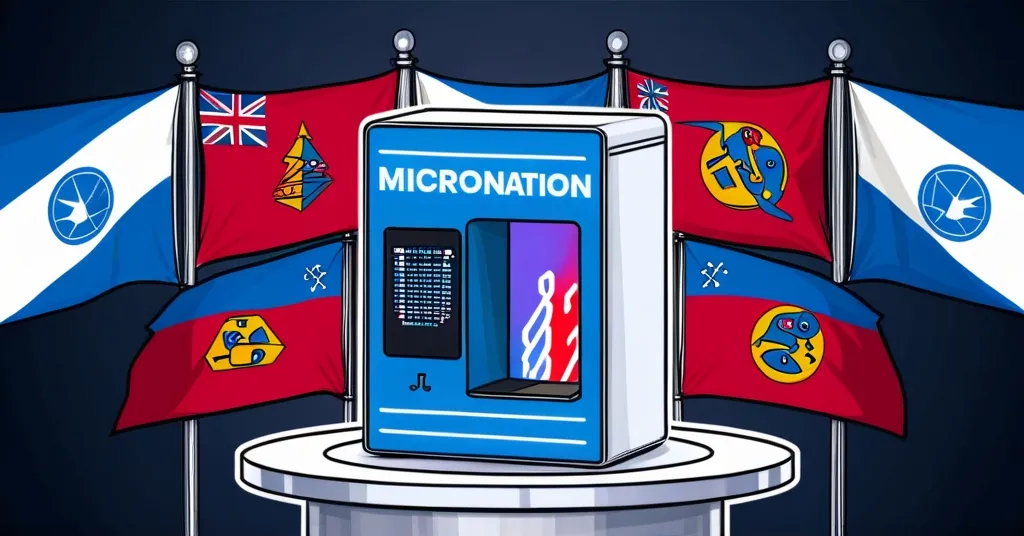Liberland’s Blockchain Elections on Jan 4, 2025: A Libertarian Leap with Justin Sun and Evan Luthra

Liberland’s Blockchain-Powered Congressional Elections: A Leap Forward for Libertarian Governance
Can a micronation nestled between Croatia and Serbia redefine democracy with blockchain technology? Liberland, the self-proclaimed libertarian micronation, is set to hold its congressional elections on January 4, 2025, using blockchain to ensure a decentralized and tamper-proof voting process. This bold move aims to set a new standard for democratic engagement and governance.
- Election on January 4, 2025
- Blockchain voting mechanism
- 15 candidates, including Justin Sun and Evan Luthra
- Online debate on January 3
The Birth of Liberland
Liberland was founded on classical liberal ideals, advocating for minimal government intervention, free markets, voluntary association, and peace. Located in a disputed territory between Croatia and Serbia, Liberland has attracted libertarian enthusiasts worldwide with its promise of a society free from excessive regulation. This micronation’s commitment to blockchain governance aligns with its vision of transparent and responsive governance.
Key Candidates
The election features a diverse slate of 15 candidates, each bringing unique visions and expertise to the table.
Governance and Minimalism: Justin Sun, the Prime Minister and co-founder of the blockchain platform TRON, is a firm believer in libertarianism. He stated,
“Our success can inspire other nations to embrace libertarian principles, demonstrating that a minimalist government can bring stability and prosperity without excessive regulation or coercion.”
His focus on a smaller government model reflects Liberland’s foundational ethos. Learn more about Justin Sun’s role in Liberland and his impact on its governance.
Technology and Digital Systems: Evan Luthra, Liberland’s IT Minister, aims to revolutionize the nation’s digital infrastructure. He expressed,
“Liberland is for people who believe freedom is a fundamental right.”
His goal is to enhance Liberland’s service delivery by improving its online services, ensuring that the nation remains at the forefront of technological governance. Discover more about Evan Luthra’s efforts on Liberland’s digital infrastructure.
Citizenship and Communication: Karnika E. Yashwant, known as Mr. KEY, brings a wealth of blockchain experience. He promises to streamline citizenship processes and improve communication, saying,
“Liberland is a movement for freedom, choice, and innovation. My candidacy is grounded in actionable solutions that position Liberland as a trailblazer for liberty-driven governance.”
His enthusiasm for Liberland’s potential is palpable, as he further added,
“Liberland is freedom in its purest form. But let’s face it: We’ve got the ideas, but we need structure. We’ve got the talent, but we need action.”
International Relations and Empowerment: Samuela Davidova, currently serving as Liberland’s Press Secretary, is also running for Congress. Her priorities are clear:
“As a candidate for Congress, my focus is clear: streamline foreign relations, empower citizens, and deliver real, tangible benefits. No reinventing the wheel. Let’s amplify what works and eliminate unnecessary obstacles.”
Her approach emphasizes practical improvements and effective governance. Stay updated on recent developments in Liberland’s citizenship processes and foreign relations.
Blockchain Voting in Liberland
Liberland’s use of blockchain for voting is a testament to its commitment to transparency and decentralization. Blockchain, a decentralized ledger of transactions recorded on multiple computers, ensures that votes are secure and verifiable, aligning perfectly with Liberland’s libertarian ethos of minimizing government intervention. By leveraging blockchain, Liberland aims to provide a voting system that is not only tamper-proof but also accessible to its global community of e-residents. Learn more about the Liberland blockchain voting system.
Citizen Engagement
To engage its citizens directly in the electoral process, Liberland is hosting an online debate on January 3, accessible to the public via Zoom. This event will allow citizens to interact with candidates, gaining insight into their platforms and visions for Liberland’s future. Such initiatives reflect Liberland’s commitment to fostering an active and informed citizenry. Join the discussion on Liberland congressional elections candidates.
The Dark Side of Blockchain Voting
While the optimism surrounding Liberland’s approach is undeniable, let’s not get blinded by the blockchain hype—real challenges lurk beneath the surface. The implementation of blockchain voting on a large scale raises concerns about security and privacy. For instance, the potential for 51% attacks, where a group could control the majority of the network’s mining power, poses a significant threat to the integrity of the voting process. Ensuring voter anonymity while maintaining the transparency of the blockchain is another complex issue that Liberland must address. Additionally, the practical implications of a minimalist government model in real-world governance need careful scrutiny. So, while Liberland’s vision is inspiring, we must keep our eyes wide open to the potential pitfalls. Learn more about blockchain voting security concerns.
Challenges and Potential
Critics of Liberland’s approach argue that the feasibility of a libertarian micronation in the modern world is questionable. Political scientists may point out the challenges of maintaining sovereignty and international recognition. Technologists might highlight the technical complexities of securing a blockchain voting system. Yet, Liberland’s ambition to serve as a global model for libertarian governance cannot be understated. The potential for Liberland to inspire other nations and communities to embrace decentralized governance and innovation is a testament to its pioneering spirit.
Bitcoin and Liberland
Although Liberland’s voting system does not directly use Bitcoin, the principles of decentralization and freedom that underpin Bitcoin align closely with Liberland’s goals. Bitcoin’s ethos of financial sovereignty and resistance to centralized control resonates with Liberland’s vision of a society where individuals have maximum autonomy. This shared commitment to decentralization highlights the broader movement towards a more liberated and self-governing future. Explore more about Justin Sun’s candidacy in Liberland.
Key Takeaways and Questions
- What is the significance of using blockchain for Liberland’s elections?
Blockchain technology ensures a decentralized and tamper-proof voting process, aligning with Liberland’s libertarian ethos of minimizing government intervention and maximizing transparency.
- Who are the key candidates in the Liberland congressional elections?
Key candidates include Justin Sun, Evan Luthra, Karnika E. Yashwant (Mr. KEY), and Samuela Davidova, each bringing unique focuses and promises to enhance Liberland’s governance.
- What are the main objectives of the candidates running for Congress?
Justin Sun aims for a minimalist government, Evan Luthra seeks to overhaul digital systems, Karnika E. Yashwant focuses on improving citizenship processes and communication, and Samuela Davidova prioritizes streamlining foreign relations and empowering citizens.
- How does Liberland plan to engage its citizens in the electoral process?
Liberland is hosting an online debate on January 3, open to the public via Zoom, allowing citizens to directly interact with candidates and understand their platforms.
- What is the term length for Liberland’s Congress, and why is it set this way?
The term length is 3 months, designed to keep the government fast-moving and adaptable, reflecting Liberland’s commitment to responsive and dynamic governance.



